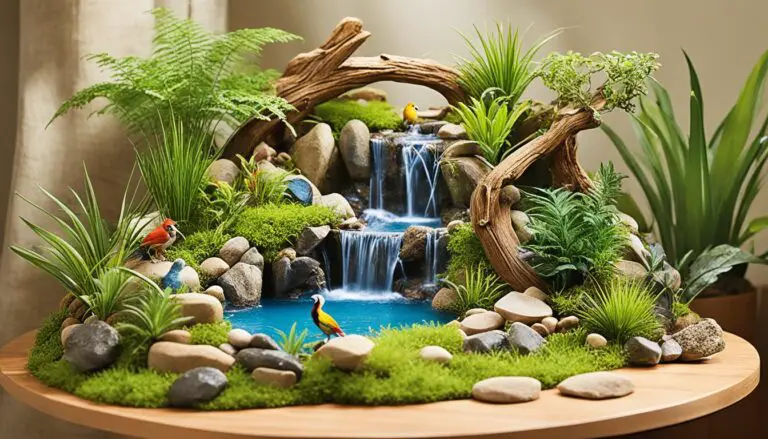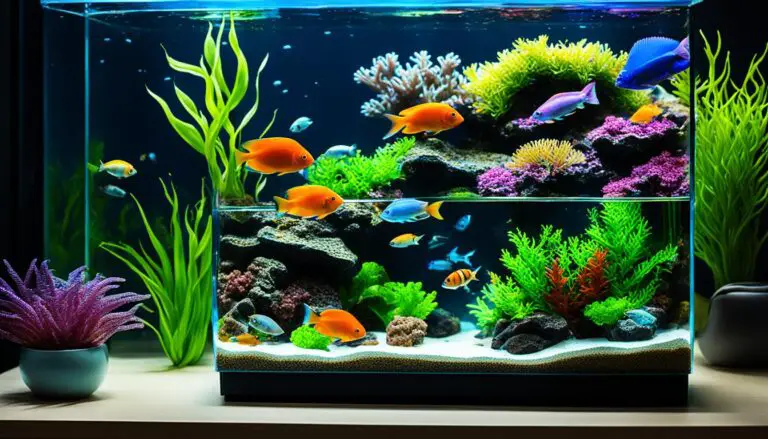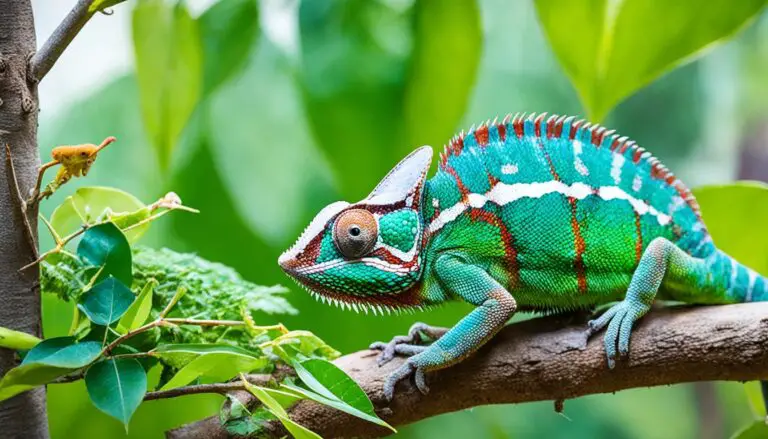Exotic Pet Health and Wellness Products Guide
Inadequate care is the top reason exotic pets get sick or die. These special animals need more focused care to stay healthy. It’s important to use the right pet care and health items to keep them well.
Key Takeaways:
- Exotic pets need special care to be well.
- The main cause of exotic pets getting sick or dying is not enough care.
- There are many health and wellness items made just for these unique pets.
- Working with a vet who knows about exotic pets is crucial for their health.
- With the right care and products, exotic pets can be happy and healthy.
What is an Exotic Pet?
An exotic pet is a species that isn’t native to our homes but kept as a pet. It includes more than just cats and dogs. Small mammals like guinea pigs and rabbits, along with reptiles, amphibians, and birds, fall into this group. Knowing how to properly care for each type is key.
“Exotic pets bring a sense of wonder and adventure to our lives. They come in all shapes and sizes, from furry little creatures to scaly reptiles and colorful birds. But what exactly makes a pet exotic? Simply put, exotic pets are those that don’t fit into the category of traditional domesticated animals like cats and dogs. These unique creatures require a specialized approach to care, as their needs can differ greatly from those of more common pets.”
Exotic pets offer a broad range of choices. You can go with cuddly small mammals or go exotic with reptiles, amphibians, or birds. Each pick brings a unique and interesting aspect to having a pet.
Each exotic pet needs something different for care. For instance, small mammals like hamsters need a comfy home. Reptiles must have the right heat and humidity. Birds, on the other hand, need a lot of space, plenty to do, and good food.
Key Points:
- An exotic pet is different from a usual pet, like a cat or dog, in appearance and behavior.
- This group includes a variety of creatures, such as small mammals, reptiles, amphibians, and birds.
- To keep an exotic pet healthy, it’s important to know exactly what they need.
Check the table below for a summary of some commonly kept exotic pet species:
| Exotic Pet Species | Description |
|---|---|
| Small Mammals | Includes rodents, rabbits, and ferrets. They require proper housing, enrichment, and a balanced diet. |
| Reptiles | Includes turtles, iguanas, and snakes. They need controlled temperature, UVB lighting, and an appropriate enclosure. |
| Amphibians | Includes frogs, newts, and salamanders. They require a suitable aquatic or semi-aquatic habitat and regular water quality checks. |
| Avian | Includes parrots, cockatiels, and finches. They need a spacious cage, mental stimulation, and a varied diet. |
Making a good home for these unique pets is crucial for their well-being. By learning what each one needs and meeting those needs, you can form a great bond. This way, you and your exotic pet will be happy together.
Handling and Restraint of Exotic Pets
Exotic pets need gentle care combined with confident handling. This keeps them safe and reduces their stress. It’s especially important when you have a reptile, rodent, or rabbit, ensuring they feel secure and safe.
For exotic pets, handling should be calm and stress-free. This means moving slowly and avoiding loud noises. Also, make sure your pet feels secure at all times.
Many exotic pets get scared easily. This can be bad for their health. By staying calm and using low-stress methods, you make a better life for your pet.
Remember these essential care tasks when handling exotic pets:
- Approach the pet calmly to avoid frightening it.
- If needed, use gloves to protect both you and the animal.
- Always support your pet’s body safely, without hurting any sensitive areas.
- Don’t hold your pet too tightly to prevent stress and harm.
- Give your pet time to get used to your touch before doing more.
Expert Tip: Creating a Positive Handling Experience
“Making handling positive is very important for exotic pets. Use gentle methods and build trust slowly. This develops a strong relationship of trust between you and your pet.” – Dr. Amanda Rodriguez, Exotic Pet Specialist
Dos and Don’ts of Exotic Pet Handling and Restraint
| Do | Don’t |
|---|---|
| Approach calmly and slowly | Rush or startle the pet |
| Use gentle, confident handling techniques | Apply excessive force or pressure |
| Provide secure support for the pet | Handle the pet roughly or carelessly |
| Get familiar with the pet’s behavior and preferences | Force the pet into unfamiliar or uncomfortable situations |
| Seek guidance from a veterinarian or experienced exotic pet handler | Attempt handling tasks without proper knowledge or training |

Housing and Environment for Exotic Pets
It’s key to provide the right home for your exotic pet. They are very sensitive and need special conditions for good health. This guide will show you how to create the perfect home for your unique friend.
Climate Control and Enclosure Safety
“Making a cozy and safe space for your exotic pet is top priority. Choose a calm, draft-free place for the enclosure. Make sure it’s impossible for your pet to get out, keeping them safe.”
Exotic pets often need particular temperatures and humidities. Find out what your pet likes and keep their home just right. Use tools like thermometers to check and adjust these conditions often.
Great lighting is also a must. Some pets, such as reptiles, need special lights for their health. Use UVB lights in your pet’s home to give them the light they require.
Bedding Substrates and Hygiene
Choosing the right bedding is crucial for your pet’s health and happiness. Different pets like different kinds of bedding. For example, you might choose from shredded paper, aspen shavings, coconut fiber, or reptile carpet. Make sure to keep their bedding clean and fresh.
“Keeping your pet’s home clean is vital for their health. Clean the enclosure often to avoid bacteria. Use safe cleaning products meant for exotic pets to keep them safe.”
Resource Access
It’s important to have food, water, and hiding spots available for your exotic pet. Always make sure there is fresh food and water around. Include things like branches or toys for fun and mental exercise.

| Key Considerations for Exotic Pet Housing and Environment | Benefits |
|---|---|
| Climate Control | – Maintains optimal temperature and humidity – Supports physiological well-being |
| Enclosure Safety | – Prevents accidental injuries and escapes – Protects against intruders |
| Bedding Substrates | – Provides comfort and insulation – Absorbs moisture and odor |
| Hygiene | – Prevents bacteria growth and infections – Ensures cleanliness and odor control |
| Resource Access | – Supports physical and mental stimulation – Promotes natural behaviors |
Nutrition and Diet for Exotic Pets
Exotic pets need the right food to stay healthy and happy. Their diets are very specific. It’s vital to feed them what they’d find in the wild. This keeps them well and living longer.
Always look for food made just for your type of exotic pet. Many companies make meals tailored for different species. These special diets ensure your pet gets the nutrients it needs. But remember, not all foods you find are good for them.
Choose a diet that fits your pet’s needs. For example, some pets like reptiles and amphibians eat live prey. Others prefer fresh veggies and fruits. Knowing what your pet eats is key to its health.
It’s not just about the type of food. A balanced diet is a must. Your exotic pet needs proteins, carbs, fats, and vitamins. Give them a little of everything to stay healthy and grow strong.
Don’t forget fresh water for your pet. It’s essential for hydration and digestion. Change the water often to keep it clean.
Bad eating habits can hurt your exotic pet. It might get sick with vitamin, gut, or tooth problems. To keep your pet well, feed it what’s right for its species.
Get advice from a vet who knows about pets like yours. They can recommend what to feed your exotic friend. They might suggest a ready-made food or even a diet you make at home. Also, regular vet visits help spot any diet problems early.
Diet Tips for Exotic Pets
- Learn what your exotic pet should eat.
- Use ready-made food that’s for your pet’s kind.
- Keep water fresh and available.
- Watch how much your pet eats and adjust as needed.
- Give your pet different foods to keep meals interesting.
- Always check with a vet to make sure your pet’s diet is right.
By making sure your exotic pet eats well, you’re looking after its health. This is an important part of keeping them happy and thriving.
| Dietary Tips for Exotic Pets | Consequences of Inadequate Nutrition |
|---|---|
| Find out what your pet needs to eat. | It might lack important vitamins. |
| Give it food meant for its kind. | It could have stomach troubles. |
| Always have fresh water available. | Its teeth could get bad. |
| Pay attention to how much it eats. | Their immunity might weaken. |
| Feed it various foods for a fun diet. | It could grow slower. |
| Discuss its food with a vet. | Your pet could get sick. |

Enrichment and Wellbeing for Exotic Pets
Enrichment is key for the health of odd pets kept at home. These animals need an environment that keeps them both physically and mentally healthy. It should be like their natural home, but safe, and engaging. By adding things that make them think and move, we make their lives better.
It’s important to give them the right toys. These toys should remind them of hunting or playing in the wild. Rodents might like puzzles or things to chew. Birds, on the other hand, could get fun out of finding hidden treats in their toys. These toys help them stay happy and stop them from being naughty because they’re bored.
Also, seeing interesting things is good for these pets. Plants or pictures of where they came from can make reptiles feel comfortable. Small mammals like to watch other animals or moving objects. This entertainment is more than fun; it keeps their brains and senses sharp.
Most kinds of odd pets love to climb or fly high. By adding things for them to climb on or rest, we give them a mini adventure park. This makes them feel at home and keeps them fit and mentally sharp.
Some of these pets really like having friends. They can be happier and less stressed when they live with others of their kind. Yet, it must be done right. Getting a new pet has to be managed well to keep everyone safe and happy.
Benefits of Enrichment and Positive Social Interactions:
- Prevents boredom and stereotypic behaviors
- Reduces stress and anxiety
- Stimulates mental and physical activity
- Enhances overall wellbeing and happiness
Enriching the lives of exotic pets through the provision of species-appropriate toys, visual stimuli, structures for climbing and resting, and positive social interactions is essential for their physical and emotional health. By investing in their wellbeing, we can create a harmonious and fulfilling environment that allows these extraordinary animals to thrive.

| Enrichment | Benefits |
|---|---|
| Species-appropriate toys | Stimulation, mental engagement, and prevention of undesirable behaviors |
| Visual stimuli | Entertainment, sensory stimulation, and overall wellbeing |
| Structures for climbing and resting | Exercise, natural behavior expression, and comfortable rest |
| Positive social interactions | Companionship, socialization, and improved welfare |
Veterinary Care for Exotic Pets
Exotic pets, like reptiles or birds, need regular check-ups from a specialized vet. These visits are key to keeping them healthy. They help spot any health problems early, offering your pet a better, longer life.
Keep an eye on your pet’s daily habits. You should notice if they eat less or act different. Catching changes early means you can get help from a vet fast, possibly preventing serious issues.
Each year, a vet will give your exotic friend a full health check. This includes looking at their body, signs, and running blood tests. Such tests can find hidden issues and keep your pet in top shape.
Getting rid of parasites is vital too. These tiny invaders can make pets very sick. Regular checks and treatments can keep your pet safe from these bugs.
“Regular check-ups and screenings are musts for your exotic pet’s health.”
If your unusual pet stops eating, loses weight, or acts oddly, don’t wait. Call the vet right away. Early vet care is very important and can help turn things around for your pet.
Remember, special animals have special vet needs. Picking a vet who knows a lot about exotic animals is crucial for good care.
Common Veterinary Procedures for Exotic Pets
| Veterinary Procedure | Description |
|---|---|
| Annual Physical Examination | A comprehensive check-up to assess overall health, body condition, and vital signs. |
| Routine Blood Work | Evaluation of organ function and detection of underlying health issues. |
| Parasite Screenings | Identification and treatment of common parasites to prevent health complications. |
| Daily Monitoring | Observation of behavior, appetite, and weight to detect subtle changes and seek veterinary attention promptly. |
Supplements for Exotic Pets
A balanced, nutritious diet is key for exotic pets’ health. Still, some may need extra help. Supplements for exotic pets can target health issues and boost wellbeing. Always talk to a vet who knows about exotic pets before adding any supplements to their diet.
There are many kinds of supplements for exotic pets. You can find nutritional and herbal supplements. They help with eyesight, liver health, the immune system, and dealing with stress.
Vision support supplements have nutrients that keep pets’ eyes healthy. They include antioxidants and vitamins. These protect eyes and keep vision sharp.
Liver support supplements help detox the liver and keep it healthy. They might have milk thistle. This herb can protect and help the liver work better in pets.
Immune support supplements boost your pet’s immune system. This helps pets fight off sickness. They contain antioxidants, vitamins, and herbs known to improve immune health.
Stress support supplements are good for pets that get stressed. They include calming herbs. These can help pets relax and lower their anxiety.
Not all exotic pets need supplements. Always follow your vet’s advice.
Work with a vet who knows exotic pets to find the right supplements. The vet will look at your pet’s type, age, and health. They’ll also choose based on your pet’s specific needs.
Supplements can’t replace a good diet. They add support. Keep an eye on your pet and see the vet regularly to make sure the supplements are helping.
| Supplement | Benefits |
|---|---|
| Vision support supplements | Promote healthy eyesight and protect ocular structures |
| Liver support supplements | Assist in detoxification and maintain liver health |
| Immune support supplements | Strengthen the immune system and enhance overall vitality |
| Stress support supplements | Promote relaxation and reduce anxiety in exotic pets |
Conclusion
Taking good care of exotic pets means keeping them healthy and happy. They need regular visits to the vet, the right food, and a fun place to live. Meeting their needs helps exotic pets live a full life.
It’s important for exotic pets to see the vet often. Vets check their health and give them shots and tests. This helps find and fix health problems early. Also, feeding them the right food is key to staying healthy.
Exotic pets need more than just food and doctors. They should have toys, things to climb on, and chances to meet others. This makes sure they’re happy and not bored. It’s vital to make a home for them that feels like their natural environment.
By doing all these things, exotic pet owners can make their pets truly happy. With love and attention, their pets can lead a life full of health and joy.
FAQ
What are exotic pets?
How should exotic pets be handled and restrained?
What are the housing and environmental requirements for exotic pets?
What should exotic pets be fed?
How can the wellbeing of exotic pets be maintained?
How often should exotic pets receive veterinary care?
Can exotic pets benefit from supplements?
Source Links
- https://www.happyhealthypets.com/pet-resources/comprehensive-guide-to-caring-for-exotic-pets
- https://www.oakhurstvet.com/blog/the-big-needs-of-small-animals-understanding-the-basics-of-exotic-pet-care/
- https://www.rahuedu.org/uploads/1/0/8/0/108006111/supplements-for-exotic_pets.pdf
Peter Stones is the founder of Exotic Pets Place, the leading online resource for exotic pet care information.
With over 10 years of hands-on exotic pet ownership experience, he is deeply passionate about sharing his expertise to help others properly care for their unusual pets.
When he's not writing extensively researched articles or connecting with fellow exotic pet enthusiasts worldwide, you can find Peter at home tending to his own beloved menagerie of exotic animals.







